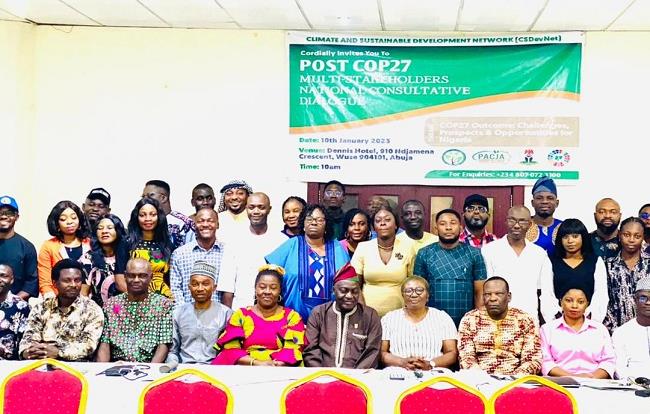Civil society organisations (CSOs) operating under the umbrella of the Climate and Sustainable Development Network (CSDevNet) have deliberated on outcome of the 27th Session of the Conference of the Parties (COP27) to the United Nations Convention on Climate Change (UNFCCC) for effective implementation of climate issues across the country.

The Network called on government at all levels and relevant stakeholders to intensify efforts to ensure that issues deliberated at the COP27, held in Sharm El-Sheikh, Egypt in 2022, on climate change challenges were strongly implemented.
The organisations said this at a Post-COP27 Multi-Stakeholders National Consultative Dialogue, organised by CSDevNet on Tuesday, January 10, 2023, in Abuja.
The Chair, Board of Trustees of the CSDevNet, Prof. Ibrahim Choji, said the essence of the meeting was to view the outcome of the COP27 and to proffer a way forward as a country.
Choji, who expressed worry over slow implementation of climate change issues, called all relevant stakeholders and government agencies to put more effort into addressing the climate challenges in the country.
According to him, the implementation of climate change is a bit slow in Nigeria compared to other African countries such as Egypt, South Africa and Kenya, among others.
“So, the essence of this meeting is to engineer more actions so that we can pressurise the government on its toes to be able to tackle climate change challenges in our various communities across the country.
“The President, Muhammadu Buhari, in 2022 signed the Climate Change Bill into law, it is a good move, it shows that the implementation will be effective.
“But the CSOs, the non-governmental organisations and other stakeholders should work together and pressurise the government to think of further actions on the issues,’’ he said.
Choji said heavy floods which destroyed property and lives in 2022 should properly be addressed, adding that the issues would continue in frequency, if the trend could not be reversed by building climate resilience.
The National Network Coordinator, CSDevNet, Mr Atayi Babs, said the organisation meets every year with relevant stakeholders and government officials after attending the COP to deliberate on the outcome of each COP and make public its findings and recommendations.
Atayi said that, after the deliberation, the stakeholders would provide a strong communique, which would be presented to the Federal Government to know the outcome of the negotiation and ways to advance.
“We usually meet with some civil society stakeholder’s representing six geo-political zones every year after the conference, we deliberate on the issues already discussed at the COP.
“The essence of the meeting is to bring back to Nigeria the issues that relate to our government, the CSOs, the private sectors and Nigerians at large, to enable them know how to address such issues.
“The effort will help Nigerians to really be aware of what happened at the conference and how it affects Nigeria, what are the key activities of the conference and how can Nigerians derive benefit from it,’’ he said.
He described the CSDevNet is the leading coalition of the CSOs, working on climate and sustainable development, adding that their key objective is to facilitate climate-resilient and sustainable Nigeria.
Dr Sam Ogalla, CSDevNet Board Member and Climate Finance Adviser at the Commonwealth Secretariat, said that the secretariat had engaged various programmes to support the countries for effective implementation of climate issues.
He said: “For us at the Commonwealth secretariat, we have our common climate programmes across the 36 countries around the world.
“Under our climate change programme, we have a lot of initiatives to support our member countries in terms of accessing climate finance to help them access the resources that they need.
“We are also supporting the implementation of Nationally Determined Contributions (NDCs), which is the key in the mitigation of climate change challenges.
“The purpose of the NDCs was to ensure that each of the member counties work toward reducing national emissions and adapt to the impacts of climate change,’’ he said.
Dr Priscilla Achakpa, Founder and Executive Director, Women Environmental Programme (WEP), commended the government and other stakeholders for their commitment and strong participation at the COP27, in 2022.
“From the Nigeria perspective and their participation, they really did very well this time around, the participation was interesting even African CSOs participated fully.
“We mobilised ourselves and had our own demands even before we reached the conference.
“One of our demands was the establishment of a fund for loss and damage, which was adopted and some of the gender issues presented, we were able to get them into the final outcome.
“Even though we did not get enough of the demands that we wanted. But I will say that Nigerians put up their very best at the COP27.
“Yes, I will say that the conference was fair even though we cannot rate it 100 per cent fair,’’ Achakpa said.
By Vivian Emoni
